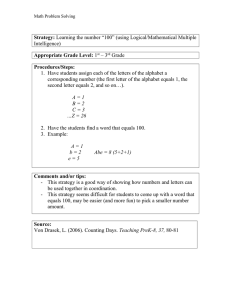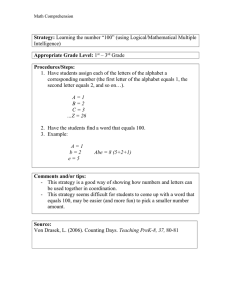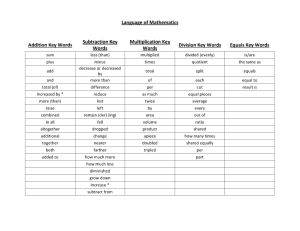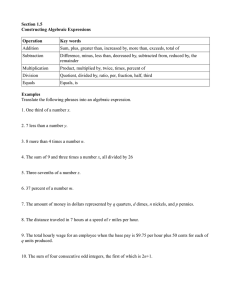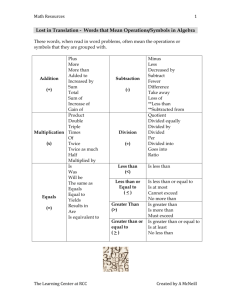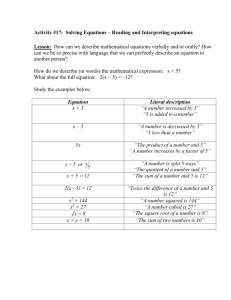CSC 142 Overriding methods from the Object class: equals, toString CSC142 NN 1
advertisement
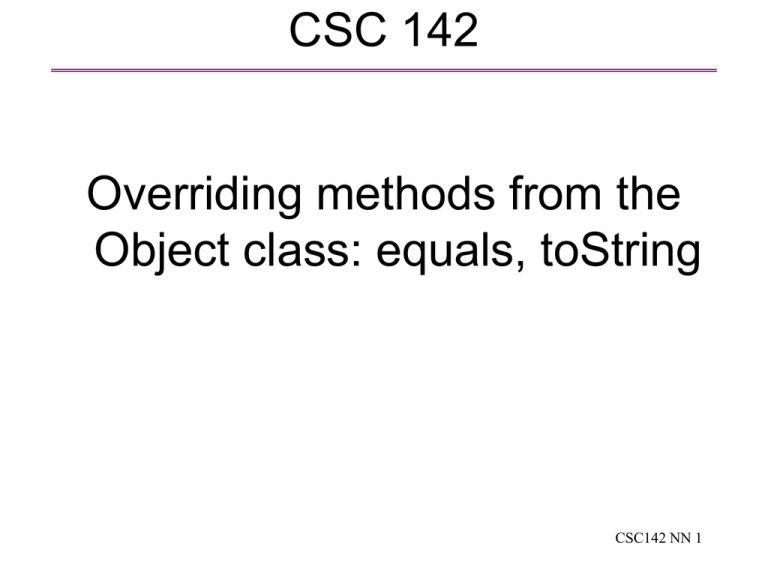
CSC 142
Overriding methods from the
Object class: equals, toString
CSC142 NN 1
Object class
The ultimate superclass
Any object is an Object
MyClass c = new MyClass();
System.out.print(c instanceof Object);
//prints true
All methods from Object are inherited by any
other class
Should they be overridden?
Take a look at toString and equals.
CSC142 NN 2
public String toString() (1)
public class Car {
private String make;
private double weight;
public Car(String theMake, double theWeight) {
make = theMake;
weight = theWeight;
}
}
Car c = new Car(“Ford”, 2000);
System.out.println(c.toString());
// prints Car@82ba41
// name of the class + some hash code
Override toString in Car to make it more
meaningful
CSC142 NN 3
public String toString() (2)
public class Car {
private String make;
private double weight;
public Car(String theMake, double theWeight) {
make = theMake;
weight = theWeight;
}
public String toString() {
return “make = “ + make + “, weight = “ + weight;
}
}
Car c = new Car(“Ford”, 2000);
System.out.println(c.toString());
// prints make = Ford, weight = 2000.0
Always override toString()
CSC142 NN 4
public boolean equals(Object o)
Implemented in Object as
public boolean equals(Object o) {
return this == o;
}
OK?
Car c1 = new Car(“Ford”, 2000);
Car c2 = new Car(“Ford”, 2000);
System.out.println(c1.equals(c2)); // prints false
Fix: override equals within Car
CSC142 NN 5
equals (2)
public class Car {
// previous code omitted
public boolean equals(Object o) {
if (o instanceof Car) {
Car c = (Car) o;
return (this.weight == c.weight &&
this.make.equals(c.make));
}
else {
return false;
}
}
}
o must be a Car: check with instanceof
Use equals to compare fields that have a
reference type (such as String).
CSC142 NN 6
Does it work?
Car c1 = new Car(“Ford”, 2000);
Car c2 = new Car(“Ford”, 2000);
System.out.println(c1.equals(c2));
// prints true.
But wait!
What if Car is inherited?
CSC142 NN 7
equals and inheritance
public class FancyCar extends Car{
private double topSpeed;
public FancyCar(String theMake,
double theWeight, double theTopSpeed){
super(theMake, theWeight);
topSpeed = theTopSpeed;
}
public boolean equals(Object o) {
if (o instanceof FancyCar) {
FancyCar fc = (FancyCar) o;
return (super.equals(o) && this.topSpeed == o.topSpeed);
}
else {
return false;
}
}
}
Car c = new Car(“Ford”, 2000);
FancyCar fc = new FancyCar(“Ford”, 2000, 200);
System.out.print(c.equals(fc)); // prints true
System.out.print(fc.equals(c)); // prints false
CSC142 NN 8
What is going on?
A FancyCar is a Car
fc instanceof Car is true
A Car is not a FancyCar
c instanceof FancyCar is false
One requirement of equals is that
if x.equals(y) is true, then y.equals(x) is also true.
instanceof checks an is_a relationship
A necessary condition for two variables to be equal is that
they have the same dynamic type.
Get the dynamic type with getClass(). Don’t use instanceof.
CSC142 NN 9
A better equal
In Car
public boolean equals(Object o) {
if (o != null && o.getClass() == this.getClass()) {
Car c = (Car) o;
return (this.weight == c.weight &&
this.make.equals(c.make));
}
else {return false;}
}
In FancyCar
public boolean equals(Object o) {
if (o != null && o.getClass() == this.getClass()) {
FancyCar fc = (FancyCar) o;
return (super.equals(o) && topSpeed==fc.topSpeed);
}
else {return false;}
}
CSC142 NN 10
One last word
Check the class website for the complete code of the
previous examples
If equals is overridden, override hashcode as well. See
later in 143…
CSC142 NN 11

